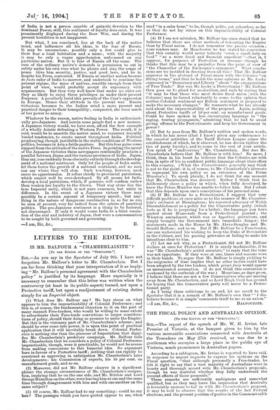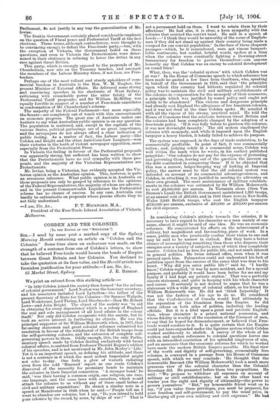Sin,—The report of the speech of Mr. W. H. Irvine,
late Premier of Victoria, at the banquet given to him by the various mercantile associations connected with Australia at the Trocadero on May 27th received, as was due to a gentleman who occupies a large place in the public eye of Victoria, much prominence in Australian papers.
According to a cablegram, Mr. Irvine is reported to have said, in response to urgent requests to express his opinions on the Fiscal question, "that although personally a Free-trader, he felt it right to say that a vast majority of Australians were in hearty and thorough accord with Mr. Chamberlain's proposals, though he was doubtful whether they fully understood the present effects of those proposals."
These remarks are sufficiently ambiguous and somewhat qualified, but as they may leave the impression that Australia is feverishly anxious to fall in with Mr. Chamberlain's proposal, it may be well to observe that the results of the last Federal elections, and the present position of parties in the Commonwealth Parliament, do not justify in any way the generalisation of Mr. Irvine.
The Deakin Government certainly placed considerable emphasis on the question of Fiscal peace and Preferential Tariff at the last elections. These terms, although contradictory, were thought to be convincing enough to defeat the Free-trade party,—but, with the exception of Victoria, the Government failed on these questions, and even in Victoria the Protectionists were deter- mined in their obstinacy in refusing to lower the duties in any case against Great Britain.
This party, which is strongly opposed to the proposals of Mr. Chamberlain, now sits on the Treasury benches, and amongst the members of the Labour Miruistry three, if not four, are Free- traders.
Perhaps one of the most valiant and sturdy upholders of com- mercial freedom in Australia is the Hon. W. M. Hughes, the present Minister of External Affairs. He delivered some strong and convincing speeches in his electorate of West Sydney, criticising with remarkable power the utter falsity of the Preferential Tariff proposals; and Sir William McMillan was equally forcible in support of a number of Free-trade candidates in condemnation of Mr. Chamberlain's scheme.
The majority of the Federal Parliament—but more especially the Senate—are completely out of touch with this encroachment on economic progress. The great size of Australia makes one hesitate to say what Australian public opinion is on any question. The population is scattered, and, except in the capitals of the various States, political gatherings are of no great importance, and the newspapers do not always afford a clear indication of public feeling. As a matter of fact, the Labour party—like Cobden and Bright and the other Anti-Corn-Law Leaguers—won their victories in the teeth of violent newspaper opposition, more especially from the Protectionist Press. In Victoria the feeling in favour of the Preferential proposals was apparently strong, but sufficient has been written to show that the Protectionists have no real sympathy with these pro- posals, and the majority of the Victorian Representatives are Protectionists.
Mr. Irvine, being a Victorian, has evidently accepted the Vic- torian opinion as the Australian opinion. This, however, is quite an erroneous inference. What public opinion is in Australia on these proposals can only be gauged by reference to the opinions of the Federal Representatives, the majority of whom are adverse; and in the present Commonwealth Legislature the Preferential scheme has no chance of success. In any case, Australia can hardly be enthusiastic on proposals whose precise effects they do not fully understand.
—I am, Sir, itc., F. T. HICHFORD, M.A.,
President of the Free-Trade Liberal Association of Victoria.
Melbourne.



































 Previous page
Previous page